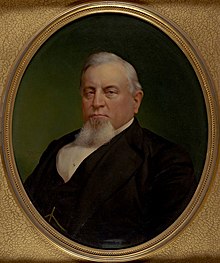Charles Crocker
| Charles Crocker | |
|---|---|

c. 1872 by Stephen W. Shaw
|
|
| Born |
September 16, 1822 Troy, New York, U.S. |
| Died | August 14, 1888 (aged 65) Monterey, California, U.S. |
| Net worth |
$20 million at death in 1888 (1/608th of U.S. GNP) |
| Political party | Republican |
| Spouse(s) | Mary Ann Deming |
Charles Crocker (September 16, 1822 – August 14, 1888) was an American railroad executive who founded the Central Pacific Railroad, which constructed the westernmost portion of the first transcontinental railroad, and took control with partners of the Southern Pacific Railroad.
Born in Troy, New York, Crocker was the son of Eliza (née Wright) and Isaac Crocker, a modest family. They joined the nineteenth-century migration west and moved when he was 14 to Indiana, where they had a farm. Crocker soon became independent, working on several farms, a sawmill, and at an iron forge. At the age of 23, in 1845, he founded a small, independent iron forge of his own. He used money saved from his earnings to invest later in the new railroad business after moving to California, which had become a boom state since the Gold Rush.
In 1861, after hearing an intriguing presentation by Theodore Judah, he was one of the four principal investors, along with Mark Hopkins, Collis Huntington and Leland Stanford (also known as The Big Four), who formed the Central Pacific Railroad, which constructed the western portion of the First Transcontinental Railroad in North America. His position with the company was that of construction supervisor and president of Charles Crocker & Co., a Central Pacific subsidiary founded expressly for the purpose of building the railroad.
Crocker bought train plows to plow the tracks of snow through the mountains, but they derailed due to ice on the tracks. He had more than 40 miles (65 km) of snow sheds built to cover the tracks in the Sierra Nevada mountains, to prevent the tracks from getting covered with snow in the winter. This project cost over $2 million.
...
Wikipedia
